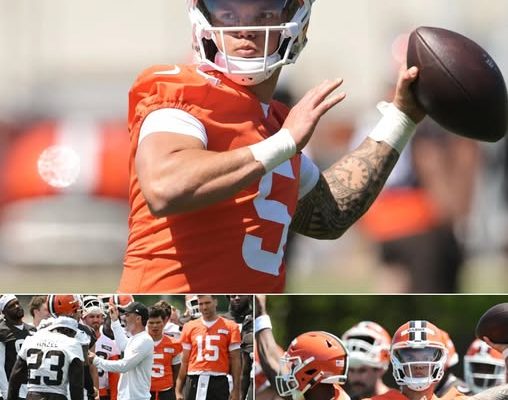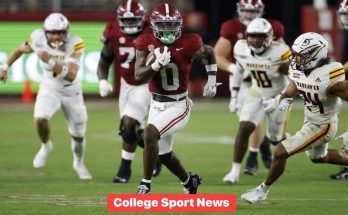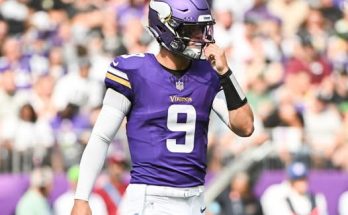The Cleveland Browns stunned many NFL observers when they used their third-round pick in the 2025 NFL Draft on Oklahoma quarterback Dillon Gabriel. It wasn’t that Gabriel was completely off the radar—he had a prolific college career and had shown plenty of promise both at UCF and Oklahoma—but the Browns weren’t exactly expected to spend premium draft capital on a quarterback this year. With Deshaun Watson carrying a fully guaranteed mega-contract and Dorian Thompson-Robinson showing flashes as a capable backup, the quarterback room in Cleveland seemed solidified. But the selection of Gabriel has thrown gasoline on the fire, igniting questions about the future direction of the team and raising eyebrows about what might really be going on behind the scenes.
Dillon Gabriel represents more than just a developmental project or insurance policy. For the Browns to use a third-round pick—generally reserved for potential starters or key contributors—signals that they see something more in the Hawaiian-born southpaw. It’s a swing that could redefine the trajectory of their franchise. While other teams used early picks to beef up offensive lines, bolster pass rushes, or add elite cornerbacks, Cleveland zagged where others zigged. They bet on a quarterback whose arm talent, mobility, leadership, and grit made him one of college football’s most electric playmakers over the last five years.
Gabriel’s journey to Cleveland is a story of resilience, growth, and elite production. He burst onto the scene at UCF, where he showcased a fearless style of play, a quick release, and impressive command of the offense. After suffering a broken clavicle in 2021, he transferred to Oklahoma, where he cemented himself as one of the most productive quarterbacks in the nation. Over two seasons with the Sooners, Gabriel threw for over 7,000 yards and 60 touchdowns, showing a high football IQ and an ability to extend plays with his legs. What truly made him stand out, however, was his decision-making and ability to read defenses pre- and post-snap. Despite being listed at just under six feet tall, his command of the pocket and leadership qualities consistently elevated his teams.
The Browns are banking on those traits translating to the NFL. Some inside the organization have even hinted that Gabriel’s selection wasn’t just about depth—it was about injecting serious competition into the quarterback room. With Deshaun Watson still under scrutiny after an underwhelming 2024 campaign marred by inconsistency and shoulder concerns, Cleveland appears to be bracing for the possibility that Watson may not return to Pro Bowl form. The decision to bring in Gabriel isn’t just a hedge—it’s a strategic gamble. Betting on a third-round quarterback to eventually start isn’t unheard of, but doing so with this level of urgency suggests the Browns might see something fans and analysts haven’t fully recognized yet.
The competition in training camp is expected to be fierce. While Watson will enter camp as the presumed starter due to his contract and pedigree, Gabriel’s early reports out of minicamp were glowing. According to several beat reporters and team insiders, Gabriel picked up the playbook faster than expected and showed impressive poise during 7-on-7 and red-zone drills. He reportedly formed an early connection with rookie wideout Jamari Thrash and backup tight end Harrison Bryant, showcasing accuracy on intermediate throws and a willingness to test tight windows.
It’s that mental toughness and quiet confidence that drew Browns GM Andrew Berry and head coach Kevin Stefanski to Gabriel during the pre-draft process. Gabriel reportedly dazzled during his interviews, impressing scouts and coaches with his understanding of protections, defensive schemes, and his detailed breakdown of game tape. According to one anonymous Browns scout, Gabriel “walked into the room and took command like a 10-year vet. He already talks like a coach and has the mindset of a pro.”
That kind of intangible value often doesn’t show up in combine results or arm strength metrics—but it does show up on game day. Gabriel’s processing speed, leadership, and ability to elevate teammates were evident every Saturday in Norman. He played with a chip on his shoulder, often carrying the Sooners through high-pressure situations and comeback wins. While critics pointed to his lack of prototypical NFL size, his anticipation and accuracy—especially on timing routes—remained strengths that evaluators consistently praised.
For the Browns, this pick may also serve a long-term strategic purpose. With the NFL quarterback market exploding financially and Watson’s contract weighing heavily on the cap, Cleveland may be quietly laying the groundwork for a future pivot. Should Gabriel show signs of being a viable starter, the team would have options it currently doesn’t possess. It could trade Watson and absorb a cap hit in the short term to gain long-term flexibility. Or, at the very least, they could rest easier knowing they have a young, cheap quarterback on a rookie deal who’s already learning the system.
Moreover, bringing in Gabriel adds another dynamic layer to the offense. Stefanski has long been lauded for his ability to design quarterback-friendly schemes that accentuate timing, rhythm, and boot-action. Gabriel thrives in systems that use misdirection, play-action, and movement to create passing lanes. His mobility allows the Browns to explore creative options in the red zone and on third-and-short, areas where Cleveland often struggled last season. If Stefanski can tailor a package for Gabriel the way the Saints once did for Taysom Hill or the Ravens did with Lamar Jackson during his rookie year, it could provide the Browns with a situational weapon that keeps defenses guessing.
But make no mistake—Dillon Gabriel isn’t just a gadget player. He’s a quarterback. And the Browns seem intent on giving him every opportunity to prove it. His biggest challenge will be overcoming the size narrative and adjusting to the speed and complexity of NFL defenses. Standing at just under 6 feet and weighing around 204 pounds, Gabriel won’t be towering over linemen or bulldozing linebackers. But in an era where quarterbacks like Bryce Young, Tua Tagovailoa, and Kyler Murray have found ways to produce at a high level despite size concerns, Gabriel’s stature shouldn’t be disqualifying.
What separates Gabriel from other developmental quarterbacks is his experience. Unlike many college quarterbacks who come into the NFL with just a season or two of starting experience, Gabriel is a battle-tested vet. He started 49 games across his college career and played in multiple offensive systems. That experience means he won’t be overwhelmed by complex blitzes, pre-snap disguises, or being thrust into tough game situations. It also means he understands how to prepare like a professional, which may accelerate his development timeline faster than some expect.
The timing of Gabriel’s arrival is critical. Cleveland is at a crossroads as a franchise. The AFC North is an unforgiving division, and the window for contention can close quickly if quarterback play isn’t consistent. With Joe Burrow leading the Bengals, Lamar Jackson returning to MVP form in Baltimore, and the Steelers reloading under Mike Tomlin, the Browns can’t afford to fall behind. Bringing in Gabriel offers both immediate insurance and long-term hope.
From a fan perspective, the move has injected excitement and intrigue into a team that desperately needed it. Gabriel’s charisma, work ethic, and underdog story resonate with Cleveland’s blue-collar identity. He’s not the five-star recruit who had everything handed to him—he’s the fighter who earned every yard, every win, and every opportunity. That kind of grit aligns perfectly with the Browns’ ethos and gives fans someone they can rally behind.
Of course, the road won’t be easy. Transitioning from college to the pros is a leap that has tripped up even the most talented quarterbacks. But if Gabriel can continue stacking good practices, absorbing the playbook, and gaining the trust of his coaches and teammates, the door is wide open for him to make noise—perhaps even sooner than expected.
The third-round shockwave that the Browns sent across the league wasn’t just about a draft pick. It was a message. A declaration that Cleveland isn’t content sitting back and hoping for things to work out. They’re actively shaping their future, and they’re betting that Dillon Gabriel might be the key to unlocking it. Whether that bet pays off remains to be seen, but one thing is certain: the Browns’ quarterback room just got a whole lot more interesting.



